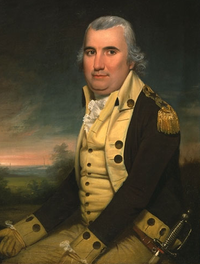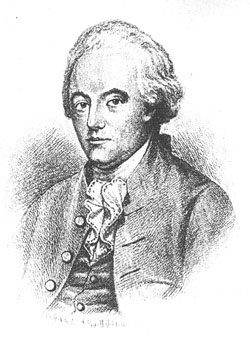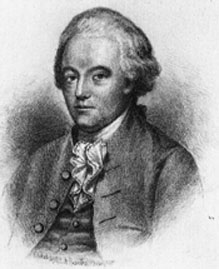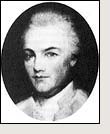Charles Pinckney (governor)
Charles Pinckney ( born October 26, 1757 Charleston, South Carolina, † October 29, 1824 ) was an American politician and multiple Governor of South Carolina, which he also represented in the Congress of the United States.
Early years and political rise
Pinckney was the son of a wealthy lawyer and plantation owner. He enjoyed a private school and then studied law with his father. In 1779 he was admitted as a lawyer. At times, he fought in the Revolutionary War, where he fell into British captivity 1780-1781. Between 1779 and 1814 Pinckney was several times delegate in the House of Representatives from South Carolina. In the years 1784 to 1787, he participated as a delegate to the Continental Congress. As this Congress, the Constitution of the United States adopted, Pinckney was one of the signatories of this document. He was also a member of the church in South Carolina, which was ratified this Constitution. In 1790 he was chairman of a commission to revise the Constitution of South Carolina. In the following years he was three times each for two years governor of his home state.
Governor of South Carolina
His first term began on January 26, 1789 and ended on December 5, 1792., He took over the office of his cousin Thomas Pinckney. During this time all government documents from the old capital Charleston to Columbia, the new capital were taken. 1790 were the first ten amendments to the U.S. Constitution, ratified the so-called Bill of Rights, South Carolina. In the same year, the constitution was amended and limited the term of a governor to two years. A direct re-election was not possible. In February 1791, the first-born in South Carolina was abolished.
Pinckneys second term began on December 1, 1796 and ended on 6 December 1798. During this time, a certain Dr. Howe bequeathed to the Agricultural Society of South Carolina his estate with the requirement to establish an agricultural school for poor children. This led to the still existing " John de la Howe School ". Also at this time, Pinckney fell out with the Federalist Party, and was a follower of Thomas Jefferson. Background of the dispute was a contrast between the population in the east of the country and in the West. In the east dwelt especially the large plantation owners, the West was rather inhabited by poorer people who had less political power and influence. Pinckney actually belonged to the group of landowners in the east; yet he also supported the political demands of the West. He thrust his old party friends on the head. His third term of office, in which he was elected as a follower of Thomas Jefferson, began in December 1806 and ended in the same month of 1808. During this time he sat down even more for the interests of the so-called " hillbilly " (Back country Men) one. He called for all white men the right to vote and better political representation of this group.
U.S. Senator
Even after the end of his second term in 1798, Pinckney was elected as a Democratic Republican to the U.S. Senate. There he remained until 1801. Jefferson thanked him for his support by appointing him ambassador in Spain. He was from 1801 to 1805. In Madrid he undertook an unsuccessful attempt to persuade the Spanish to cede Florida to the United States. From 1806 to 1808, he was again governor of South Carolina. Between 1810 and 1814 he was a deputy in the Parliament of his home state. His last political office he joined in 1819 as a deputy in the House of Representatives of the United States. This mandate he held until 1821. Thereafter, he retired from politics. He still practiced as a lawyer and died in 1824.










